It’s no secret that Google’s algorithm ranks sites by evaluating their backlink profiles. But few people realize the dominance of this ranking factor over others. According to the research of 2 million keywords, backlinks have much more correlation with high rankings than keywords, content length, meta tags, page load time, etc.
You can optimize your content for the most profitable keywords, but if your site has a weak backlink profile, Google will treat it like a third-rate resource whose rightful place is on the last pages of SERP. A backlink is like a vote in the SEO game. The more links your page has, the more proof Google sees that it’s worth ranking in the Top 10.
You may be tempted to buy backlinks in bulk, but this is a risky step no matter how easy it seems to be. With paid links, you’ll violate Google’s Webmaster Guidelines, and your site may drop out of organic search if / when the truth comes out. It won’t be easy to recover it from the penalty.
Instead, you can play fair using 19 legitimate link building tactics listed in this guide. Not only will they help you earn quality links, but also build a reputation for your business.
1. Create Link Bait Content
This is probably the most legitimate link building tactic to employ. Instead of asking for links, you’ll get them naturally. People will be interested in linking to your content themselves because of the value it offers. With its help, they’ll be able to improve the quality of their own posts – either make them more credible or informative or engaging. All they’ll need to do for this is embed a relevant link, which is a matter of a few clicks.
Check out the most popular types of link bait content used today:
- in-depth research of market trends;
- surveys of the target audience;
- case studies based on your business strategies;
- freebies, especially if they are of the same or nearly the same quality as paid stuff.
Note that people from different niches value different types of content. For example, if it’s marketing or career advice, studies draw backlinks like a magnet.
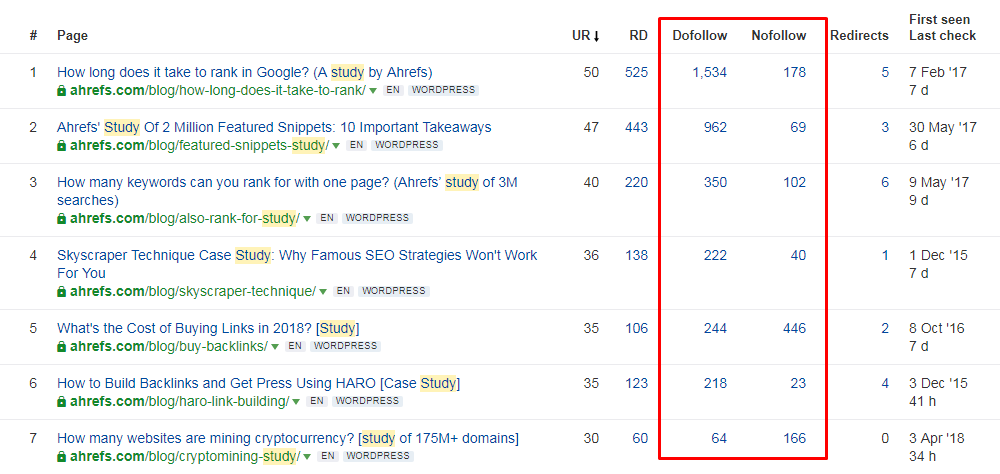
But if you’re involved in a creative field like graphic design, compilations will work much better for you. As you can see below, people actively link to posts with cool 404 pages, Facebook timeline covers, Photoshop tutorials, etc.
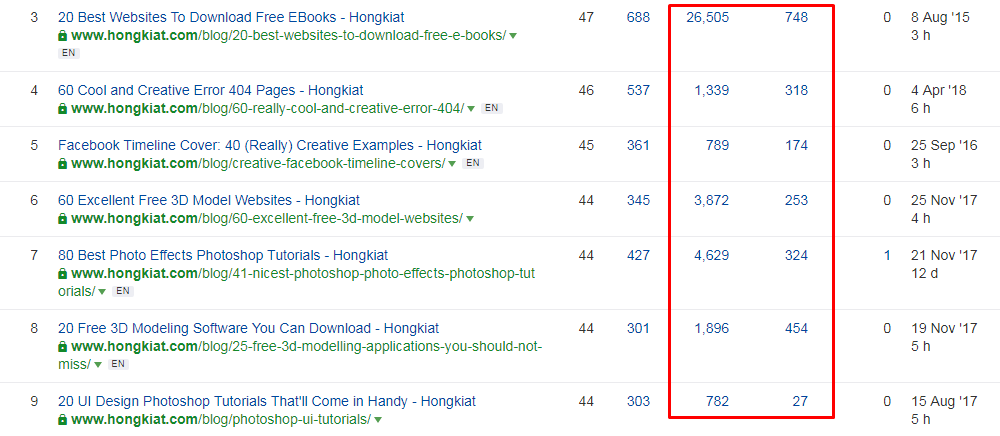
So, always check your competitors’ most linked-to posts and try to outperform them.
2. Get Links from Industry Influencers
Just like regular folks, industry influencers love seeing people’s interest in their work. That’s why the easiest way to approach them is to use a tactic dubbed “ego bait” in the SEO community. It will bring you links from the top resources in your niche and potentially their audiences.
Here are a few ways to create ego bait content.
- Ask an influencer for an interview on your site.
- Create a roundup of expert opinions like this one. With many influencers on the list, this piece of content will have a sky-high level of authority.
- Add influencers’ quotes to your articles (with link attribution).
Don’t try to catch big fish at once. They’ve been getting tons of positive feedback for years, so yours will unlikely surprise them, especially if you’re not someone easily recognizable in your circles. Start with experts who haven’t grown too big for their britches yet. They will be more responsive and appreciative of your interest in their personas.
3. Get Interviewed Yourself
Besides interviewing industry influencers, you can give interviews yourself. That way, you’ll show yourself as someone who knows the score in your niche and will be able to earn links along the way. These links will generate quality traffic to your site, i.e. visitors interested in your persona, services or content. Interviews can take the following forms:
- interviews on blogs and news sites;
- expert roundups;
- podcasts;
- webinars, etc.
4. Fix Broken Links on Your Niche Sites
Things don’t stand still on the web. Many companies go broke, and their sites shut down. On sites that are up and running, some pages lose relevance in the course of time and go to trash. Links pointing to them from other domains become broken. The good thing is you can take advantage of this time instability online.
Find broken links on the top sites in your niche and reach out to their owners, offering your content as an alternative. This tactic is beneficial for both of you, and can be taken care using SEO tools easily. You’ll get a backlink, and they will give their readers access to timely and relevant content.
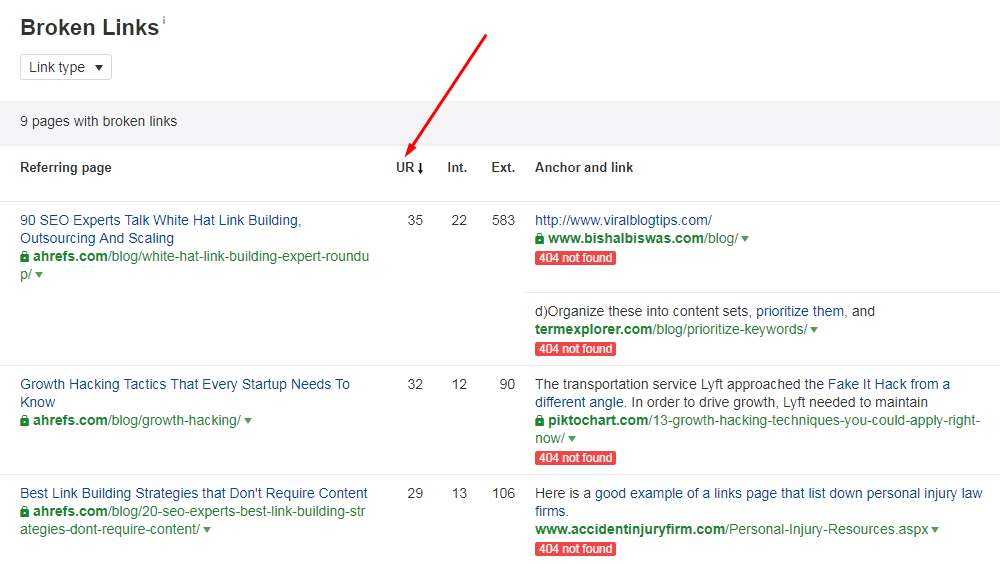
When analyzing pages with broken links, sort them by URL Rating. That way, you’ll start with pages that can provide more SEO value for your site.
5. Reclaim Existing Link Opportunities
Finding new opportunities is what link building is based on, but not limited to. There may be dozens of already existing opportunities you don’t know about. They are commonly divided into three categories.
Broken Backlinks. If some domain links to your 404 page, you’re losing link juice that’s rightfully yours. To reclaim it, set up 301 redirects for all your broken backlinks.
Unlinked Business Mentions. At times, writers can mention your business but never link to your site. In such cases, you should reach out to them, thank for the mention, and ask if it’s possible to include a link.
Copyright Infringement. Occasionally, you’ll find your copyrighted material used without your permission. Instead of getting it removed, you can turn the whole case in your favor. Notify website owners of the infringement and request that they attribute to the original source, i.e. link to your site. To check if your copyrighted pics appear around the web, use Google’s reverse image search.
6. Do Guest Posting
Guest posting goes far beyond link building. This strategy can help you gain more exposure for your services. For example, you can write a detailed how-to guide and refer to your product as to a tool to implement one of the tactics advised.
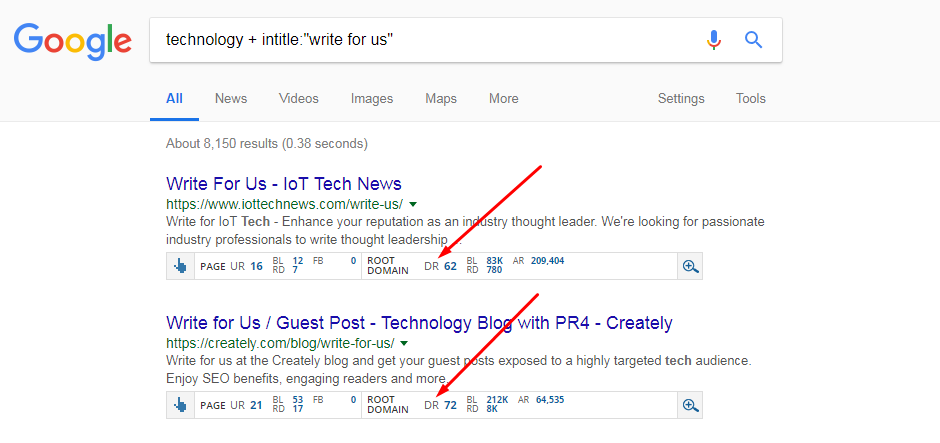
You don’t even have to mention the name of your company – just embed a link where relevant. That way, you’ll avoid any promo content issues. Bloggers typically charge no fees for posting non-promo content that’s useful to their readers.
Note that one backlink from a well-regarded site is much better than ten backlinks from low-quality resources. When choosing a site to write for, pay attention to their domain rating (DR).
7. Syndicate Your Content
Another way to get more eyes and links to your business is through content syndication. Compared to guest posting, this tactic is more time-effective. You don’t need to write a new piece of content from scratch. Just re-post your live article on third-party resources and include a link to your site as an attribution.
Consider syndicating your content to these high-quality resources:
- Medium;
- Growth.org;
- Business 2 Community;
- Linkedin Pulse.
8. Repurpose Your Content
Different people have different preferences of how to digest information. Some like reading blog posts online, while others prefer having a downloaded ebook at hand. There is also a category of people who choose to listen to podcasts or watch webinars.
If you reshape your posts into different formats, you will embrace a wider audience to earn links from. Check out popular formats to use besides plain text:
- videos;
- presentations;
- podcasts;
- ebooks.
9. Build Links with Visuals
While a picture speaks a thousand words, a digital picture can attract a thousand links. Here are common types of link-worthy images to include in your content:
- charts and graphs that visualize your research data;
- memes relevant to your niche, its burning issues, and curiosities;
- images with quotes from celebrities or famous people in your niche;
- pinnable pics in your blog posts, etc.
10. Create Infographics
This is another effective way to leverage the power of visuals in link building. Keep in mind that an infographic is just a frame for your message. Besides attractive graphics, you must share unique, well-researched information to keep it link-worthy.
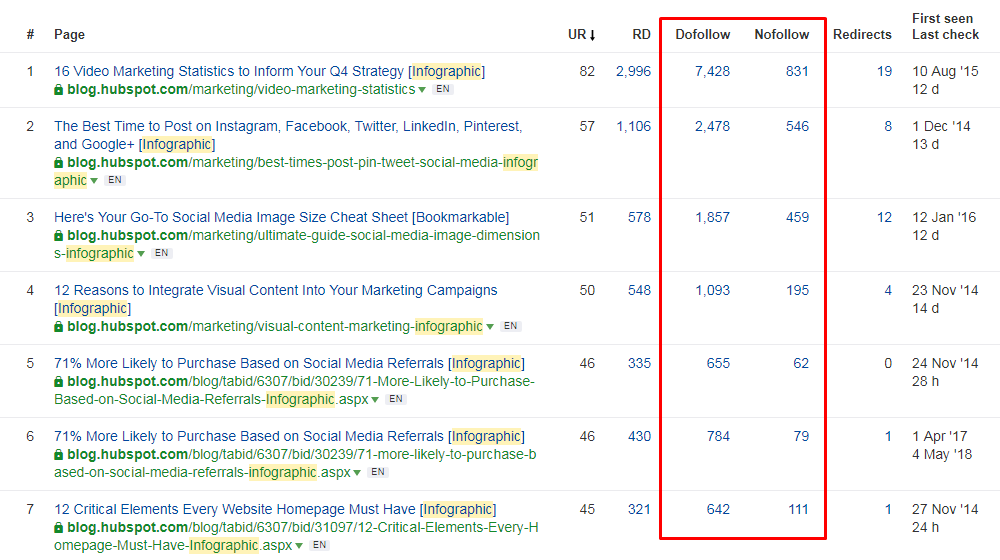
Before creating an infographic for your particular topic, check if other bloggers have outpaced you. If they have, make sure yours is either different or better regarding its visual appeal and informational value. At the start, you can also find easy-to-rank keywords and create infographics around them. That way, you’ll get more page visits in a shorter period.
11. Submit Your Site to Quality Directories
Gone are the days when you could submit your site wherever possible. Today, submissions to low-quality directories will make your backlink profile look spammy in the eyes of Google. To understand whether a directory is good enough for you, take the following steps.
- Double-check that submissions go through some sort of human revision. Otherwise, that directory is definitely a spam hub.
- Evaluate the quality of other sites in the directory to ensure it’s not a shelter for any domain.
- Make sure the directory is not a one-day wonder by checking its age on archive.org.
- Learn how clean the backlink profile of your target directory is. If you notice a huge mass of spammy links, you’d better pass it by.
12. Distribute Press Releases
Press release distribution is also among legitimate link building tactics to approach with caution. As in the case with directory submissions, Google may regard mass distribution of press releases as a sign of manipulations. But if you choose a single channel, it’ll be fine with the engine’s algorithm.
Note that your press release isn’t the best place for keyword-rich anchor text. You’d better stick with branded anchors.
13. Get Your Business into Trending News
News sites usually have a high domain rating, which means they can pass high-quality link juice to you. To make it happen, get down to newsjacking. This technique is about incorporating your business concepts into the breaking news.
When a trending story goes live, reporters start looking for opinions to cover it from a new angle. If you post a well-reasoned opinion piece on the hot topic, the chances are you’ll be noticed and featured in a big edition with a backlink to your post.
Newsjacking requires a prompt reaction from you. If you procrastinate, someone else will take your place in the front-page story. Yesterday’s news is tomorrow’s fish-and-chip paper, you know.
14. Focus on Local Citations
If you target residents of a specific location, submit your content to local business directories. As a rule, they set higher acceptance standards than general web directories, that’s why only legitimate businesses get on the list. No wonder local directories look credible to Google, which makes them sweet spots for link building.
For many prospects, local citations will be the first touchpoint with your business. So, make sure it represents your services in the best light possible.
15. Comment on Blog Posts
Blog commenting is quite an easy tactic to grow your backlink profile and become an active member of your target community. Along the way, you’ll build relationships with influential bloggers, which will let you be more productive in outreach campaigns. People are more responsive to someone who’s been on their radar for a while rather than to total strangers.
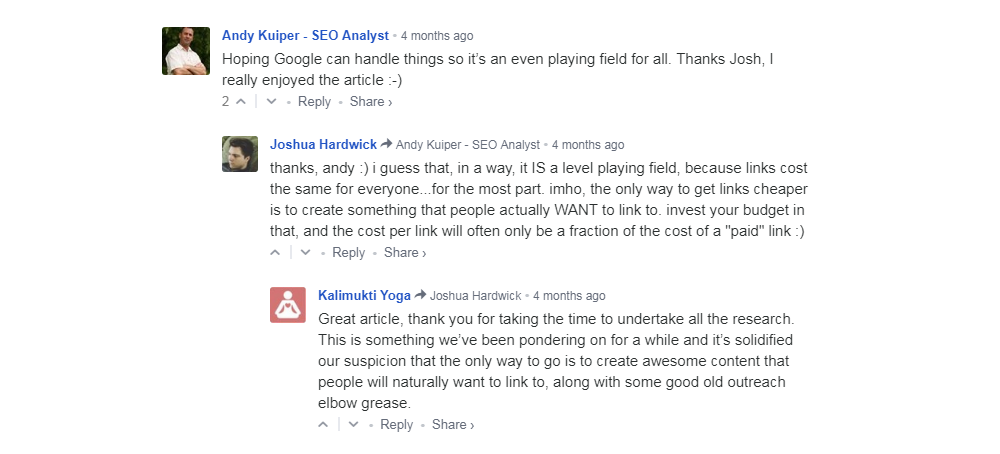
Sure thing that bombarding blogs with generic comments like “thanks, cool” is a waste of time. Each comment must be thought out and provocative enough to start up a conversation with the post author and readers.
16. Place Links on Forums
Forums are your prospects’ go-to places for expert advice. That’s why links you add there can grow your website’s KPIs, particularly domain rating, amount of traffic, and most importantly conversions.
However, such outcomes are impossible if you place a link just for the sake of it. Your link must be of great value to forum participants – either answer their questions in detail or add to the info already posted by someone else.
17. Join Niche Community Sites
Niche community sites are also places where your target audience hangs out. Let’s take Reddit for example. Self-titled “the front page of the Internet,” this huge resource has communities for any niche, be it business, finance, entertainment, whatever.
Participating in your niche community is a sure-fire way to build traffic-driving links. What’s cool is that they become dofollow once your posting gets a certain number of upvotes. Just be careful. The slightest hint at self-promotion may ruin your link building campaign on Reddit. Moderators there are always on the lookout for link manipulations.
18. Post on Question and Answer Sites
Since links on sites like Quora and Yahoo Answers are nofollow, they will pass no link juice to your site. But they still can bring you many visitors who may want to link to your content eventually.
If you run into the same question in multiple threads, it’s a signal that people couldn’t find a clear answer in Google search. This is your opportunity to be the first and the only person who will provide detailed info on it.
19. Donate to Charities
As a rule, charities reveal their sponsors right on the homepage with link attribution. Most of them have a high domain rating, that’s why becoming a sponsor can bring you quality backlinks.
Here’s an important notice. Technically, links you get for donating money are paid, which is against Google policies. But there’s a low risk of getting a penalty since the fact of buying is not as obvious as it is when you purchase links in bulk. You help people in need, and it’s none of your business that charities want to feature you with link attribution. They do it of their own free will.
Wrap-up
As you can see, these tactics can serve many other purposes besides link building. They will help you raise your brand awareness, make contact with influencers, improve your reputation, etc.
Do you know any other legitimate link building tactics that work in 2018? Feel free to share them with readers of Rohitink.com in the comment section.
About the Author: Nick Campbell
Nick Campbell is a content marketer and outreach manager at Ahrefs. He is passionate about technology, SEO, and blogging trends. When Nick is not researching a new topic, he’s probably at some high-tech event.

